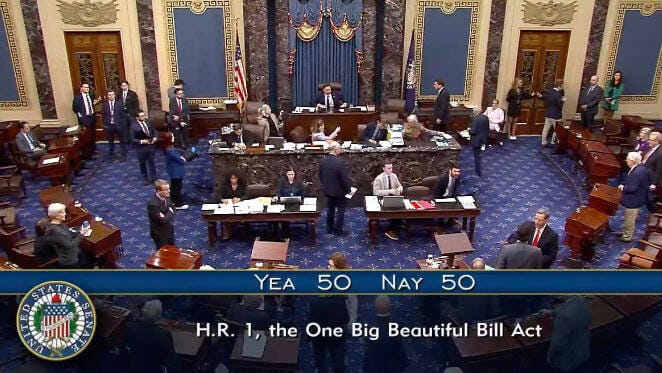So, Tell Me Why...
Why should 8,750 of my neighbors lose health care coverage when my congressmen get to keep theirs?
Just after noon on July 1, 2025, Vice-president J.D. Vance broke the 50-50 tie vote in the Senate on President Trump’s massive budget bill. Vance’s yes vote moved this bill back to the House of Representatives where it passed on July 3rd. Trump signed it into law on the Fourth of July.
Despite reservations from a host of senators and disapproval from a majority (64%) of the American people, Vice-President J.D. Vance casts the tie-breaking vote for the massive budget on July 1st. (Image from U.S. Senate Television through Associated Press)
According to the Congressional Budget Office (CBO), the provisions in this bill will kick some 11.8 million people, that’s 3.5% of the US population, off their health insurance.
So, Tell Me Why
Tell me why these members of Congress who voted for this bill get to keep their world-class health insurance and 8,750 of my family, friends, colleagues and neighbors lose theirs.
I did the math here. I live and work in two counties in Central Pennsylvania (Blair and Cambria) with a population of about 250,000 people. My area is part of Pennsylvania’s 13th Congressional District (PA 13th) represented by John Joyce. Given the numbers from the bi-partisan CBO, 8,750 of my family, friends, colleagues and neighbors will lose their opportunity to have health coverage. Pennsylvania Governor Josh Shapiro’s estimate is ever higher. His official website tallies 17,273 Medicaid recipients in the PA 13th would lose their medical coverage. The governor also warned the commonwealth’s rural hospitals could be at risk since the measure cuts billions from Medicaid.
“People who live in rural areas are more likely to have health insurance through Medicaid and are at greater risk of losing that coverage,” Lauren S. Hughes, Associate Professor of Family Medicine at the University of Colorado Anschutz Medical Campus and Kevin J. Bennett, Professor of Family and Preventive Medicine at the University of South Carolina recently wrote in The Conversation.
“We expect that the changes brought about by this new law will lead to a rise in unpaid care that hospitals will have to provide.” Small, local hospitals will have to make tough decisions regarding services, personnel and equipment purchases. Echoing an analysis by the American Hospital Association Hughes and Bennett conclude, “Many rural hospitals will have to reduce their services or possibly close their doors altogether.”
A $50 billion rural health transformation fund was included in the bill to address the impacts on rural hospitals and clinics, but this does not nearly match the foreseen losses likely resulting from the cuts which were part of the legislation. Though very urban in the corners, Pennsylvania’s three million rural residents gives it the third largest rural population in the nation. Beyond the grants not providing enough, Lisa Davis, the director of the Pennsylvania Office of Rural Health at Penn State University fears those most needing the funds could miss out. Among other concerns, smaller hospitals may not have the bandwidth to apply for and secure the share of funding they will need.
A Gimmick Intended to Deceive
This law also contains a gimmick to hide these cuts. While the tax decrease benefits for the rich go into effect immediately these health care cuts for the poor are delayed for two years. Senator Angus King of Maine tells us this means a $32,000 tax reduction per $1 million earned by an already rich individual. I wonder why the Republicans and Trump included this delay in the legislation. Could it be they don’t want us to notice the impact of the cuts on the poor until after the 2026 mid-term election? Is that being truthful or being deceitful?
Most notably, is this what the 96,000 voters who voted for the present administration and congressmen in the western-most portion of PA-13 were looking for? Whether it is or not, Tell Me Why you think the members of Congress who voted for this One, Big, Bad Bill deserve to have health care while so many others have none.
Sources:
https://www.axios.com/2025/07/01/trump-big-beautiful-bill-polling
https://www2.census.gov/geo/docs/reference/ua/State_Urban_Rural_Pop_2020_2010.xlsx
Stephen Tomlinson is a practicing Board Certified Behavior Analyst and a PA Licensed Behavior Specialist providing services to autistic children and their families. He has held special education teaching certifications in both Maryland and Pennsylvania. Stephen earned a BS in Business at the University of Baltimore where he served as the news editor for the student newspaper, a M.Ed. in Special Education at Coppin State University, and an Applied Behavior Analysis Certification from Penn State University. He was a classroom teacher for 33 years and has been a behavior analyst for the past 23 years.




